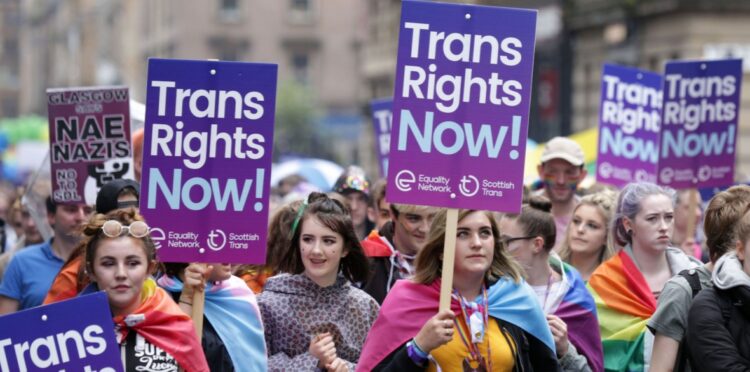By Lucy Caulkett-
Holyrood committee in charge of scrutinising the Scottish government’s gender recognition reform bill has given its support to the key principles for simplifying how transgender people can update their birth certificates – including the introduction of self-declaration.
A majority of MSPs on the equalities, human rights and civil justice committee of the Scottish Parliament recommended that the general principles of the Gender Recognition Reform (Scotland) Bill should be approved.
Committee convener Joe FitzPatrick said: “We believe these important reforms will improve the lives and experiences of trans people.”
The changes could result in the number of people applying for a gender recognition certificate (GRC) increasing from 30 a year to 250-300.
Some on the committee were concerned about the impact the reforms could have on single-sex spaces for women and girls — such as female-only toilets or changing rooms.
But Mr FitzPatrick said: “We believe these important reforms will improve the lives and experiences of trans people.”
Social justice secretary Shona Robison welcomed the committee’s support for the principles of the Bill.
She said: “Our support for trans rights does not conflict with our continued strong commitment to uphold the rights and protections that women and girls currently have under the 2010 Equality Act. This Bill makes no changes to that Act.”
But the Equality and Human Rights Commission (EHRC) has warned against the cross-border “uncertainty” that could be created by the new law.
The watchdog warned there would be “implications for the operation of the Equality Act,” which outlaws sex discrimination.
They also warn that trans people would face difficulty over their “legal status and rights” if they could obtain a Scottish GRC because they were born north of the border, but lived elsewhere in the UK.
By a recommendation of five to two, Thursday’s report by Holyrood’s equalities human rights and civil justice committee recommends the move to statutory self-declaration before the registrar general for legal gender recognition, removing the need for a psychiatric diagnosis of gender dysphoria.
It also supports reducing the age at which people can apply for a gender recognition certificate (GRC) from 18 to 16, in line with wider Scots law on legal capacity, as well as reducing the time someone must have been permanently living in their gender before they can apply, from two years to three months.
The committee’s recommendations is set to be debated by all MSPs on 27 October, after which the bill will be subject to further scrutiny and amendments. It comes a day after the Equality and Human Rights Commission detailed concerns about the cross-border impact of the legislation, and raised the prospect of Westminster government may not recognise the new Scottish certificates in the rest of the Uk
The report comes a day after the Equality and Human Rights Commission, in its second public intervention on the bill, detailed concerns about the cross-border impact of the legislation and raised the prospect the Westminster government may not recognise the new Scottish certificates in the rest of the UK
As several hundred protesters gathered outside the Holyrood parliament building to demonstrate against the plans on Thursday morning, JK Rowling – an opponent of self-declaration – posted a photograph of herself on Twitter wearing a T-shirt reading: “Nicola Sturgeon destroyer of women’s rights” and declared her solidarity with them.
However, the report addresses these concerns stating that most of the committee is satisfied the changes “will not change any of the protections or definitions set out in the Equality Act 2010, including the ability to exclude trans people from single-sex services where proportionate and appropriate”.
The committee said: “The majority is satisfied that the bill will not change or remove women’s rights, make changes to how toilets and changing rooms operate, redefine what a man or a woman is, nor change or expand trans people’s rights … Further, the majority recognise that, when asked about evidence of abuse and concerns, no witness was able to provide concrete examples.”
The report concludes that the legal status of a statutory declaration, along with the fact that making a false declaration is an offence, create a sufficiently robust process in line with international human rights best practice.
The report also acknowledges concerns about lowering the age of access from 18 to 16, but concludes “based on the evidence gathered, it is clear that most young people reach decisions about their gender identity long before they consider applying for a GRC”, while calling for extra support to be put in place for younger applicants.
Vic Valentine, the manager of Scottish Trans, welcomed the report and urged MSPs to vote in favour of the reforms “to make a real difference to the lives of trans people in Scotland”.

